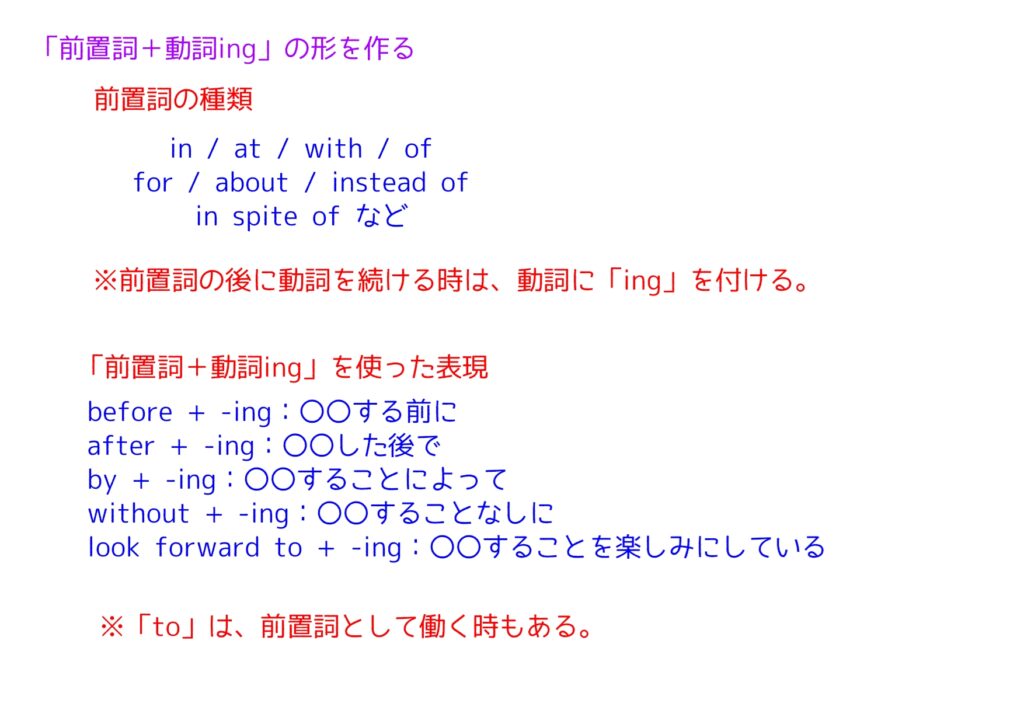第59回:「前置詞+現在分詞」を使って、副詞的な意味を付け加える。

どのような場面で使うことが出来るのかを見てみましょう。
Q. この記事で、一番大事なことって何?
A. 大事なことを、1枚の画像にまとめました。

いちいちノートにまとめるのが面倒だという方、また、
ノートにまとめることが苦手だという方は、ご活用ください。

[広告]
確かな英語力は、日々の継続から。
その継続を後押しする、第二言語習得理論に基づいた
オンライン英語学習プログラムがあります。
英語を使う人のための、確実なスキルアップが望める
7日間の無料体験はこちらから!

副詞的意味を持つ、分詞節
分詞節は、副詞的な意味を持つ文法構造です。今回確認する表現は、前置詞と現在分詞(-ing形)を用いて、時間や方法、原因などを表現します。
受動態や前置詞を用いた分詞節
「after」「before」「besides」「by」「in」「on」「since」「through」「while」「with」「without」などの前置詞を使用して、現在分詞(-ing形)を含む副詞的な意味を持つ分詞節を作ることができます。
- 例:「While understanding her problem, I don’t know how I can help.」(彼女の問題を理解した一方、どうやって助ければいいか分かりません。)
「by」「in」「on」+現在分詞(-ing形)
- 「by」「in」「on」に続けて現在分詞(-ing形)を使うことで、「方法や手段」を表現します。
- 例:「By working hard, she passed her maths exam.」(一生懸命働くことで、彼女は数学の試験に合格した。)
「by」に続けて現在分詞を使うことで「方法や手段」
「on」に続けて現在分詞を使うことで、「いつ」
「in」に続けて現在分詞を使うことで、「原因」
をそれぞれ表します。
「with」「without」+現在分詞(-ing形)
「with」は原因を表し、「without」は二つ目の行動が起こらないことを表します。また、「with」の後には主語が必要です。また、「with + -ing」の表現はかなり口語的な表現です。
- 例:「With Louise living in Spain, we don’t see her often.」(ルイーズがスペインに住んでいるので、私たちは彼女に頻繁に会えません。)
- 例:「I went to work without eating breakfast.」(朝食を食べずに仕事に行きました。)
接続詞や形容詞を用いた分詞節
接続詞や形容詞から始まる節は、主語+動詞「be」で始まる節と同じ意味を持ちますが、比較的形式張った英語で使われます。
- 例:「While in Poland, they will play two concerts in Warsaw.」(ポーランドにいる間、彼らはワルシャワで2つのコンサートを行います。)
分詞節は、副詞的な意味を表現するための文法構造です。前置詞や接続詞を用いて時間、方法、原因などを示すことができます。分詞節を使うことで、文章をより洗練された表現にすることができます。ただし、正確な文脈に合わせて使い分けることが重要です。
具体例
- Participle clauses with adverbial meaning:
- After finishing her meal, she went for a walk in the park.
- Before leaving for work, he kissed his wife goodbye.
- Besides working full-time, she also volunteers at a local charity.
- By practicing every day, he became a skilled pianist.
- In attending the conference, she gained valuable insights.
- On arriving at the airport, they realized their flight was delayed.
- Since moving to a new city, she has made many new friends.
- Through studying diligently, he achieved excellent grades.
- While watching a movie, she fell asleep on the couch.
- Without knowing the answer, he raised his hand to ask a question.
- By, in, on + -ing:
- By practicing regularly, he improved his basketball skills.
- In learning a new language, one expands their horizons.
- On reaching the mountaintop, they celebrated their accomplishment.
- By running every morning, she maintains her fitness.
- In attending seminars and workshops, professionals enhance their knowledge.
- On finishing her book, the author started working on her next project.
- With -ing; without -ing:
- With the children playing in the backyard, the parents enjoyed a quiet evening.
- With the car breaking down, they had to call for roadside assistance.
- Without checking the weather forecast, they got caught in the rain.
- Without realizing it, she made a significant impact on her colleagues.
- With the music playing softly in the background, they danced the night away.
- Without proper training, he couldn’t participate in the marathon.
- Adverbial meanings with conjunctions or adjectives:
- While traveling in Europe, they visited famous landmarks in France and Italy.
- Although tired from a long day at work, he decided to go for a jog.
- I try to eat healthy whenever possible, opting for fruits and vegetables.
- Unhappy with the service, she wrote a complaint letter to the restaurant.
- While studying for her exams, she listened to classical music for concentration.
- Although exhausted, they continued hiking up the steep mountain trail.
[広告]
TOEICのスコアを上げたいけれど、
まとまった勉強時間が取れなくて困っている…
なら、細かいスキマの時間を使いながら、
少しずつスキルを積み重ねてみてはどうでしょう。
スマホ1つでスコアアップが出来る、
オンライン講座のリンクはこちらから。

Q. この文法はどうやって使うのでしょうか?
A. 今回の文法を活用した会話文を見てみましょう。

Hey, have you seen Mark lately?
(ねえ、最近マークを見た?)

No, I haven’t. By moving to a different city for work, he’s been quite busy.
(いや、最近は見ていないよ。仕事で別の街に引っ越したから、彼はかなり忙しいんだ。)

Really? I thought he would have more free time now.
(本当?今ならもっと自由な時間があると思ってたけど。)

Well, with his new job, he’s been working long hours. Besides working during the day, he’s also studying for a certification at night.
(まあ、新しい仕事では長時間働いているんだ。昼間働いているだけじゃなく、夜は資格の勉強もしているんだよ。)

Wow, that sounds exhausting. How does he manage to do it all?
(うわ、それは大変そうだね。彼はどうやってそれを全部やりくりしているの?)

By carefully planning his schedule and prioritizing his tasks, he’s able to stay on top of everything.
(スケジュールをしっかりと計画し、優先順位をつけることで、彼はすべてのことに対応しているんだよ。)
[広告]
ロゼッタストーン・ラーニングセンターで、最先端の教育制度を活用して英語を学びませんか?私たちは個々の学習ペースに合わせてeラーニングと対面教育を組み合わせ、柔軟な学習環境を提供しています。自宅でのeラーニングと対面教育のメリットを最大限に活かし、あなたの英語学習をサポートします。最新のテクノロジーと個別の指導が組み合わさった当センターで、自由な学習スタイルを体験してみませんか?英語学習を楽しく効果的に進めるための環境がここにあります。新たな一歩を踏み出して、新しい英語学習の旅に参加しましょう!

Q. この記事の要点は?
A. 前置詞+現在分詞を活用した表現を確認しました。
- 現在分詞(-ing形)を用いた副詞的な意味を持つ節では、after、before、besides、by、in、on、since、through、while、with、withoutなどの前置詞を使用することができる。
- 現在分詞による節の代わりに、時制や主語に応じて変化する動詞を持つ節も使用することができる。
- by, in, on + 現在分詞(-ing形)の形で、手段や方法を示すことができる。
- with + 現在分詞(-ing形)は、主節での理由を示すことができる。一般的には非形式的な文脈で使用される。
- without + 現在分詞(-ing形)は、二つ目の行動が行われないことを示す。ただし、「although… not」や「unless」と類似の意味も持つことがある。
- 接続詞や形容詞から始まる節によっても副詞的な意味を付加することができる。この種の節は、接続詞+主語+be動詞から始まる節と同じ意味を持ち、比較的形式的な英語で使用される。
英会話を始めてみたいけれど、どのサービスが良いか分からない…
そんな方は、まず、この記事で3つのサービスを比べてみてはいかがでしょうか?
英語力を効率良く伸ばすことができるサービス3選です。

次回の文法解説は?
再帰代名詞の使い方
この記事を作る際に参考にした文法の解説書になります。
すべて英語で書かれていますが、練習問題が付いてます。
イギリス英語なので、スペル等の表記が異なる部分もありますが、
「使い方を練習したい」「繰り返し問題を解きたい」
という方は、使ってみても良いかもしれません。

関連記事一覧
他の文法解説記事を検索できます。






-320x180.jpg)







コメント